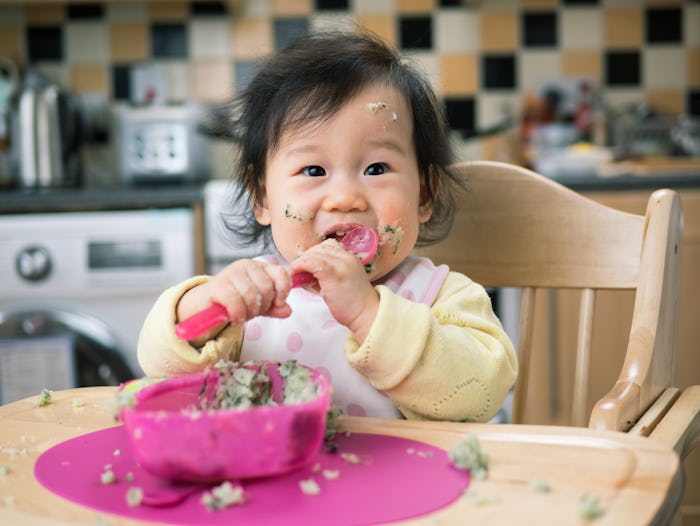Life

Here's How Teething Can Affect Your Baby's Appetite, According To Experts
When it comes to feeding your baby, you've probably noticed a lot of things, like whether they tend to eat large meals, or if they're more of a grazer. And if you've picked up on these things, then you're tuned in enough to know when something is off with your baby's eating habits. Often, these changes are blamed on teething. But does teething affect your baby's appetite, or is something else up if your normally ravenous eater is no longer interested in smashed sweet potatoes?
To help alleviate any appetite worries, I checked in with Dr. LaQuia Vinson, a pediatric dentist at Riley Children's Health, and Feeding Specialist and co-author of the book, Raising A Healthy Happy Eater: A Parent's Handbook Melanie Potock to see if teething could be the cause of your child's lack of interest in food. The answer, quite simply, is yes. In fact, Dr. Vinson tells Romper, "Teething for some infants is an uncomfortable process, and as a result they may not want to eat or nurse."
Potock agrees and says for babies, "pain can easily override [their] willingness to eat." So, if this is something you're dealing with, don't worry — it's pretty normal. Potock explains, "The more [your] baby attempts to eat and experiences discomfort, the more likely they learn to eat 'just enough' to help the hunger subside, but never enough to truly fill their bellies and stay full." If this sounds like your baby, chances are that they're just grazing enough to get by — no wonder teething babies can be so cranky.
But the good news is, there are things you can do to make the situation better for your baby and yourself. Dr. Vinson says things that are cool can help and suggests "a cold (and clean) washcloth or a frozen water-filled teething ring" to help alleviate some of the discomfort. But if the pain seems unbearable for your little one, Dr. Vinson suggests using infant Tylenol. Just be sure to check with your doctor before giving your baby any medicine.
If your baby is still having trouble eating, Potock suggests letting your baby play with their food "to encourage more oral exploration." She explains that this can make them "more likely to suck and mouth their own fingers," as they get all messy. Which not only helps soothe gums (especially if the food is chilled), but also gets actual food in their mouth — which is a huge win if your kid won't eat. Potock says it's even helpful to "keep purees and foods like thin slices of peeled, soft pear in the refrigerator and serve just a bit at a time." She also suggests "slightly thawed frozen fruits [that] can be offered in hand-held silicone feeders," to help with relief without your baby's fingers getting too cold.
Still not sure if you should bring your baby's lack of eating up with the doctor? Dr. Vinson says moms should call their child's pediatrician when their baby "significantly deviates from their normal feeding schedule (especially after offering cool things or even Tylenol). Parents should [also] become concerned if the child won’t drink fluids," or gets a high fever or becomes lethargic.